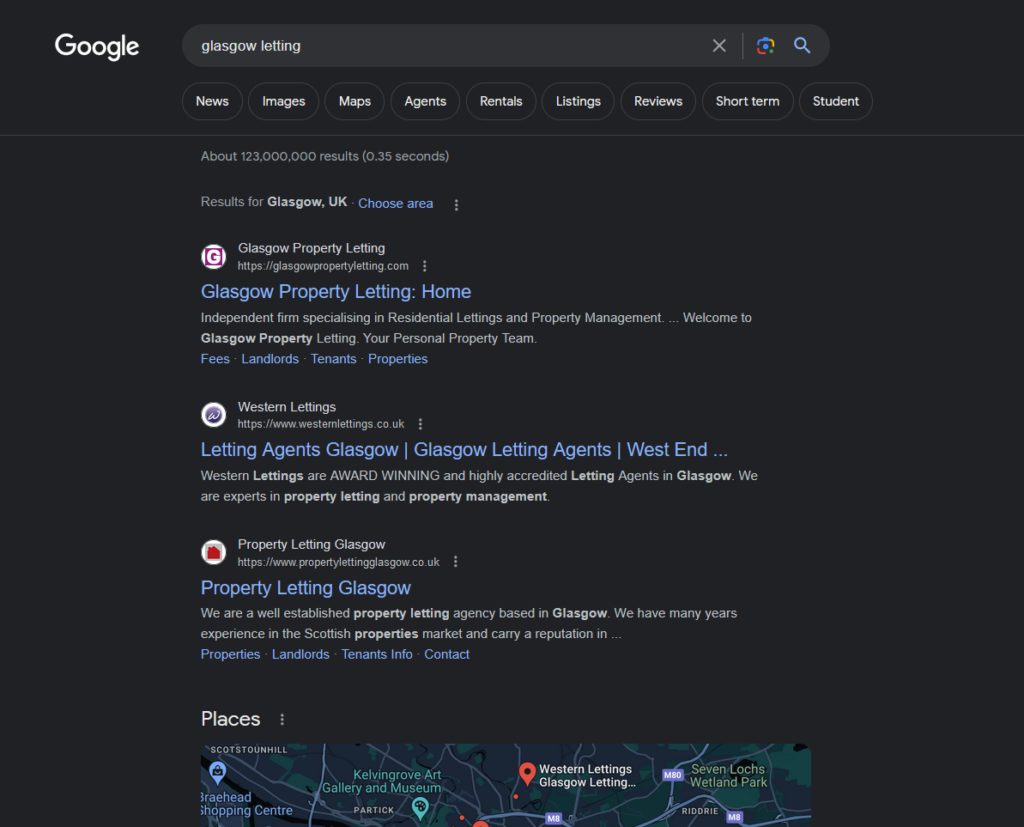The Importance of SEO in Real Estate
SEO, or Search Engine Optimization, is like putting up eye-catching billboards on the internet highway. For estate agent SEO, the key is being seen by potential clients searching for properties online.
Imagine you’re driving through a town, looking for a place to eat. The restaurants with the brightest signs and best locations are the ones you’ll notice first.
SEO works the same way for your real estate website. It helps you stand out in the crowded online market.
The Challenge of Ranking High
Getting to the top of search results is no easy feat. Think of it as trying to secure a prime spot on the town’s main street.
Big corporations often own the best locations, just like they dominate 8 to 9 of the top-ten positions in search results for terms like “[city] real estate” or “[city] homes for sale.”
But don’t be discouraged! Even if you’re an independent estate agent, there are ways to make your mark.
How to Stand Out
Some independent agents have managed to secure top spots in search results. How? They’ve had their domain registered for over 15 years with dynamic content.
It’s like having a well-established shop in town that everyone knows and trusts.
Want to learn how to get your website on Google in just 5 minutes? Check out this guide. It’s tailored to help estate agents like you make a strong online presence.
Top Ten Rankings For Estate Agent SEO

The Dream and the Reality of Estate Agent SEO
| The Dream | The Reality |
|---|---|
| Top Google Rankings | Big corporations own 8 to 9 top spots |
| Visibility to Potential Clients | Independent agents in top ten are rare |
| Increased Business Opportunities | Requires long-standing domains and dynamic content |
Estate agents often dream of being in the “top ten” on Google. It’s like having a prime storefront in the city’s busiest street.
But here’s the reality.
Big corporations often own 8 to 9 of those top spots. Independent agents or brokerages in the top ten are rare.
Why Top Rankings Are Rare in Estate Agent SEO

They’ve likely had their domain registered for over 15 years. They’ve been using dynamic content, like an ever-changing window display.
You might wonder, can you ever knock them off the top?
The answer is complex.
A Real Estate SEO Success Story
An agent in Liverpool managed to top the search engines for many real estate terms. His success wasn’t because of the website designs, but because he registered his domains in 1996.
This meant his domain had 20+ years of credibility and other sites linking to the domain.
Google trusted the website as a credible source.
The Secret: Dynamic Content
So, what’s the secret?
Dynamic content.
This consists of an IDX feed and blogging. Google recognizes variable content and gives extra points against static real estate websites.
For example, if you’re an estate agent in New York, regularly updating your listings and blogging about the local market can boost your online presence.
Useful Resources
Want to know more about real estate SEO keywords?
Here’s a comprehensive guide that breaks down what real estate SEO is. It identifies the top real estate keywords like “realtor” and “real estate housing market.”
Or maybe you’re looking for the top SEO keywords for 2022?
This blog post has the latest insights. It’s like having a digital marketing expert at your fingertips.
SEO Strategies for Estate Agents

Embracing Dynamic Content
Dynamic content is your friend in the world of SEO.
Think of it as the ever-changing window display of your online real estate shop. It’s content that changes regularly, like an IDX feed or blogging.
IDX Feeds: A Must-Have
An IDX feed is like having a live catalog of properties on your website. It updates automatically. Google loves fresh content. It’s like offering a new dish on the menu every day.
It keeps your website appealing to both search engines and potential clients.
Blogging: Share Your Insights
Blogging is another powerful tool. Share insights about the local market, tips for buyers, or spotlight properties. It’s like having a friendly chat with potential clients.
You build trust and show your expertise. Regular blogging can position you as a go-to expert in your area.
Keywords: Choose Wisely
Keywords are the terms people search for. Like “New York real estate” or “Miami homes for sale.”
Choosing the right ones is crucial. It’s like picking the right location for your physical office.
Avoiding Static Websites
Static websites are like old, unchanging billboards. They don’t attract attention. Keep your site lively. Regularly update listings, share news, and engage with visitors. It’s how you stay relevant.
A lively website is more likely to rank higher in search results, drawing more potential clients to your services.
Utilizing Social Media
Don’t forget about social media. Platforms like Facebook and Instagram can be powerful allies.
By sharing your listings, engaging with followers, and showcasing your success stories, social media can amplify your online presence, making your SEO efforts even more effective.
Tailoring Strategies to Your Market
Understanding your local market is key. Tailor your SEO strategies to the specific needs and interests of your target audience.
Research local trends, understand what your potential clients are looking for, and provide content that speaks directly to them.
SEO is not a one-size-fits-all solution. It requires understanding your market, choosing the right tools, and staying up-to-date with the latest trends.
By embracing dynamic content, utilizing IDX feeds, blogging regularly, and engaging on social media, you can make SEO work for you.
Top Estate Agent SEO Keywords for 2023

What Are Keywords?
Keywords are like the signposts on a road. They guide people to your website. If you’re an estate agent, keywords are the terms people use to find properties online.
How to Find Keywords: A Step-by-Step Guide for Beginners
- Identify Your Target Audience: Think about who you want to reach. First-time buyers? Investors? Tailor your keywords to them.
- Use Keyword Tools: Tools like Google’s Keyword Planner can help you find popular search terms. It’s like having a map of what people are looking for online.
- Analyze Competitors: Look at what keywords other estate agents are using. Don’t copy, but learn from them.
- Choose Relevant Keywords: Pick keywords that match your services. If you sell luxury homes, use terms like “luxury real estate.”
- Use Keywords Naturally: Don’t stuff keywords into your content. Use them naturally, like sprinkling spices into a dish.
Top Real Estate SEO Keywords in 2023
- Local Keywords: Include your city or neighborhood. Like “Edinburgh homes for sale” or “Glasgow letting”
- Property Types: Use terms that describe the properties you sell. Such as “flats,” “townhouses,” or “single-family homes.”
- Buying and Selling Terms: Words like “foreclosure,” “short sales,” or “best realtor” are often searched by buyers and sellers.
- Market Insights: Terms like “real estate market trends” or “housing market forecast” can attract informed buyers.
How to Use Keywords in Content
- In Titles: Use keywords in the titles of your blog posts or web pages.
- In Meta Descriptions: Include them in the short descriptions that appear in search results.
- Throughout Content: Use keywords naturally throughout your content. Like adding landmarks to a scenic route.
- In Image Descriptions: If you have images of properties, include keywords in the descriptions.
Common Mistakes and Misconceptions
Myth 1: SEO Is Only for Tech Experts
Many believe SEO is only for tech experts. That’s not true.
SEO is like basic home maintenance. With the right tools and guidance, anyone can do it.
Myth 2: More Keywords Means Better Ranking
Some think stuffing a page with keywords will boost rankings. This is a mistake.
Google sees through this tactic. It’s like overloading a dish with salt; it ruins the taste.
Myth 3: Social Media Doesn’t Affect SEO
Some say social media has no impact on SEO. They’re wrong.
Social media is like word-of-mouth advertising online. It boosts your visibility and credibility.
Myth 4: Real Estate SEO Results Are Instant
Expecting instant results from SEO is a common misconception. SEO is a slow process.
It’s like planting a garden. It takes time and care to grow.
Common Mistakes and How to Avoid Them
| Mistake | Description | Solution |
|---|---|---|
| Ignoring Mobile Users | Many websites aren’t mobile-friendly. Google ranks mobile-friendly sites higher. | Make sure your site looks good on all devices. |
| Duplicate Content | Copying content from other sites is penalized by Google. | Always create original content, like offering a unique property. |
| Neglecting Local SEO | Ignoring local SEO is common but vital for real estate agents. | Use location-specific keywords, like advertising in your local community newspaper. |
| Not Using Analytics | Not tracking your SEO efforts means you can’t improve what you don’t measure. | Use tools like Google Analytics, akin to having a financial report for your business. |
Conclusion
Real estate SEO is filled with myths and common mistakes. But with the right knowledge, you can navigate through them.
Understanding these misconceptions and avoiding common errors can make your online presence strong. It’s about building a robust online strategy, just like you would build relationships with clients in the real world.
These insights are designed to help estate agents like you succeed in the online market. They’re practical, actionable, and tailored to make a real difference in your business.
TL;DR
- SEO in Real Estate: Like eye-catching billboards.
- Ranking High Challenge: Corporations dominate top results.
- Standing Out: Long-standing domains, dynamic content.
- Top Ten Rankings Reality: Top rankings rare but possible.
- Dynamic Content Secret: Updating listings, blogging.
- Social Media Utilization: Amplifies SEO efforts.
- Tailoring Strategies: Understand local market.
- Real Estate SEO Keywords: Guide to your website.
- Mistakes and Misconceptions: Avoid for strong strategy.
Real estate SEO is complex but essential. Embracing dynamic content, social media, and understanding the local market can make SEO work. These insights are practical and tailored to help real estate professionals succeed online.


